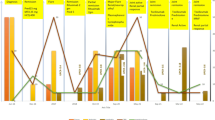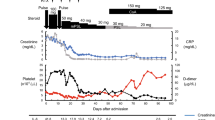Abstract
There are few reports about the rapid appearance of anti-adalimumab antibodies in patients with Crohn’s disease positive for anti-infliximab antibodies. We report the case of a 29-year-old female patient with a diagnosis of Crohn’s disease who revealed a loss of response to infliximab due to high levels of antibodies to infliximab, and did not respond to the subsequent therapy by adalimumab, with a rapid appearance of antibodies to adalimumab. As one of the possible mechanisms of non-response to adalimumab, immunologic reactivity of infliximab to adalimumab was suspected, since the patient’s IgG that was obtained just before the induction of adalimumab reacted with infliximab and adalimumab. We should pay attention to the easy appearance of anti-adalimumab antibodies in association with reactivity of anti-infliximab antibodies to adalimumab in patients with high levels of anti-infliximab antibodies.



Similar content being viewed by others
Abbreviations
- TNF:
-
Tumor necrosis factor
- IFX:
-
Infliximab
- ADA:
-
Adalimumab
- PVDF:
-
Polyvinylidene difluoride
- ATI:
-
Anti-infliximab antibody
- ATA:
-
Anti-adalimumab antibody
References
Cassinotti A, Travis S. Incidence and clinical significance of immunogenicity to infliximab in Crohn’s disease: a critical systematic review. Inflamm Bowel Dis. 2009;15:1264–75.
Hanauer SB, Wagner CL, Bala M, et al. Incidence and importance of antibody responses to infliximab after maintenance or episodic treatment in Crohn’s disease. Clin Gastroenterol Hepatol. 2004;2:542–53.
Vermeire S, Noman M, Van Assche G, et al. Effectiveness of concomitant immunosuppressive therapy in suppressing the formation of antibodies to infliximab in Crohn’s disease. Gut. 2007;56:1226–31.
Karmiris K, Paintaud G, Noman M, et al. Influence of trough serum levels and immunogenicity on long-term outcome of adalimumab therapy in Crohn’s disease. Gastroenterology. 2009;137:1628–40.
Yanai H, Hanauer SB. Assessing response and loss of response to biological therapies in IBD. Am J Gastroenterol. 2011;106:685–98.
West RL, Zelinkova Z, Wolbink GJ, et al. Immunogenicity negatively influences the outcome of adalimumab treatment in Crohn’s disease. Aliment Pharmacol Ther. 2008;28:1122–6.
Chaparro M, Guerra I, Munoz-Linares P, et al. Systematic review: antibodies and anti-TNF-alpha levels in inflammatory bowel disease. Aliment Pharmacol Ther. 2012;35:971–86.
Imaeda H, Andoh A, Fujiyama Y. Development of a new immunoassay for the accurate determination of anti-infliximab antibodies in inflammatory bowel disease. J Gastroenterol. 2012;47:136–43.
Imaeda H, Bamba S, Takahashi K, et al. Relationship between serum infliximab trough levels and endoscopic activities in patients with Crohn’s disease under scheduled maintenance treatment. J Gastroenterol. 2014;49:674–82.
Bartelds GM, Wijbrandts CA, Nurmohamed MT, et al. Clinical response to adalimumab: relationship to anti-adalimumab antibodies and serum adalimumab concentrations in rheumatoid arthritis. Ann Rheum Dis. 2007;66:921–6.
Bartelds GM, Krieckaert CL, Nurmohamed MT, et al. Development of antidrug antibodies against adalimumab and association with disease activity and treatment failure during long-term follow-up. JAMA. 2011;305:1460–8.
Sandborn WJ, Rutgeerts P, Enns R, et al. Adalimumab induction therapy for Crohn disease previously treated with infliximab: a randomized trial. Ann Intern Med. 2007;146:829–38.
Sandborn WJ, van Assche G, Reinisch W, et al. Adalimumab induces and maintains clinical remission in patients with moderate-to-severe ulcerative colitis. Gastroenterology. 2012;142(257–65):e251–3.
Bartelds GM, Wijbrandts CA, Nurmohamed MT, et al. Anti-infliximab and anti-adalimumab antibodies in relation to response to adalimumab in infliximab switchers and anti-tumour necrosis factor naive patients: a cohort study. Ann Rheum Dis. 2010;69:817–21.
Frederiksen MT, Ainsworth MA, Brynskov J, et al. Antibodies against infliximab are associated with de novo development of antibodies to adalimumab and therapeutic failure in infliximab-to-adalimumab switchers with IBD. Inflamm Bowel Dis. 2014;20:1714–21.
Imaeda H, Takahashi K, Fujimoto T, et al. Clinical utility of newly developed immunoassays for serum concentrations of adalimumab and anti-adalimumab antibodies in patients with Crohn’s disease. J Gastroenterol. 2014;49:100–9.
Steenholdt C, Svenson M, Bendtzen K, et al. Acute and delayed hypersensitivity reactions to infliximab and adalimumab in a patient with Crohn’s disease. J Crohn’s colitis. 2012;6:108–11.
Roblin X, Rinaudo M, Del Tedesco E, et al. Development of an algorithm incorporating pharmacokinetics of adalimumab in inflammatory bowel diseases. Am J Gastroenterol. 2014;109:1250–6.
Acknowledgments
This study was supported by a Grant-in-Aid for Scientific Research from the Ministry of Education, Culture, Sports, Science and Technology of Japan (24590940), and a Grant from Intractable Diseases, the Ministry of Health, Labor and Welfare of Japan.
Disclosures
Conflict of Interest: Prof. Akira Andoh served as a lecture speaker for Mitsubishi Tanabe Pharma Co. and Eisai Co. Ltd. Kenichiro Takahashi, Takehide Fujimoto, Makoto Shioya, Atsushi Nishida, Shigeki Bamba, Osamu Inatomi, Hirotsugu Imaeda and Katsuyuki Kitoh declare that they have no conflict of interest.
Human/Animal Rights: All procedures followed were in accordance with the ethical standards of the responsible committee on human experimentation (institutional and national) and with the Helsinki Declaration of 1975, as revised in 2008(5).
Informed consent: Informed consent was obtained from all patients for being included in the study.
Author information
Authors and Affiliations
Corresponding author
Rights and permissions
About this article
Cite this article
Takahashi, K., Fujimoto, T., Shioya, M. et al. A case of Crohn’s disease that developed anti-infliximab and anti-adalimumab antibodies. Clin J Gastroenterol 8, 88–91 (2015). https://doi.org/10.1007/s12328-015-0558-y
Received:
Accepted:
Published:
Issue Date:
DOI: https://doi.org/10.1007/s12328-015-0558-y




